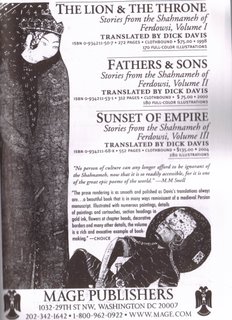Thursday, January 12, 2006
222. نقش ِ كليدي ي ِ "ادب" در جهان ِ امروز: ديدگاه يك فرهيخته بانوي ايراني
يادداشت ويراستار
جمعه 23 دي ماه 1384
(سيزدهم ژانويه 2006)
بانو دكتر آذر نفيسي، استاد ادب سنجشي (پيشتر در ميهش ايران و اكنون در آمريكا) يكي از چهره هاي سرشناس و پويا و پيشرو در پژوهش و نقد ادبي ي روزگار ما در گستره ي جهاني و با سنجه هاي جهان شمول است. در دو دهه ي گذشته، اثرهاي ارزشمند ِ چندي از او به زبان هاي فارسي و انگليسي نشريافته كه از آن ميان كتاب او به نام ِ :
Reading Lolita in Teheran
در جهان غرب با پذيره ي گسترده اي رو به رو گرديد و در زمره ي كتابهاي پُرفروش درآمد.
در جهان غرب با پذيره ي گسترده اي رو به رو گرديد و در زمره ي كتابهاي پُرفروش درآمد.
چندي پيش در پيام ِ دوستي به اين دفتر، خبر رسيد كه ترجمه ي تازه ي شاهنامه ي فردوسي از ديك ديويس با پيشگفتار ي از آذر نفيسي در آمريكا منتشر شده است. متن اين ترجمه، تا كنون به اين دفتر نرسيده و هنوز جاي سخن گفتن از آن نيست.
ي از آذر نفيسي در آمريكا منتشر شده است. متن اين ترجمه، تا كنون به اين دفتر نرسيده و هنوز جاي سخن گفتن از آن نيست.
 ي از آذر نفيسي در آمريكا منتشر شده است. متن اين ترجمه، تا كنون به اين دفتر نرسيده و هنوز جاي سخن گفتن از آن نيست.
ي از آذر نفيسي در آمريكا منتشر شده است. متن اين ترجمه، تا كنون به اين دفتر نرسيده و هنوز جاي سخن گفتن از آن نيست.به تازگي نيز نشريّه ي كانادايي ي اُد در شماره ي 29 خود در گفتاري از تيجين توبِر، به بحث در باره ي كارهاي نفيسي پرداخته و ديدگاه هاي ادبي ي او را در گستره ي جهان كنوني كه مهاجرت و جا به جايي ي قومي و ناگزير هم آميزي ي زباني و ادبي و فرهنگي شناسه ي نمايان ِ آن است، تجزيه و تحليل كرده است.
متن اين گفتار خواندني در باره ي بانوي شايسته ي ادب شناسي و نقد ادبي ي ِ اين روزگار را براي آگاهي ي خوانندگان ِ ادب دوست اين صفحه، در پي مي آورم. ج. د.
The republic of imagination
Tijn Touber
This article appeared in Ode issue: 29
Post-national writers pioneer a new global literature Worldwide migration, telecommunication technologies and mass media have not only made the world smaller, but mixed it all up. No culture is homogeneous anymore, no race intact, no language pure, no soccer team national. What’s left to connect us in this chaotic, uprooted world? What can bring us together, blending our hearts and feelings in a new global culture? Of course! Literature. Or as literature is called in the words of Azar Nafisi, the Iranian author of the bestseller Reading Lolita in Teheran: “imaginative knowledge.” In the Los Angeles-based journal of global politics and culture NPQ (summer 2005), she says:
“imaginative knowledge.” In the Los Angeles-based journal of global politics and culture NPQ (summer 2005), she says:
 “imaginative knowledge.” In the Los Angeles-based journal of global politics and culture NPQ (summer 2005), she says:
“imaginative knowledge.” In the Los Angeles-based journal of global politics and culture NPQ (summer 2005), she says: “While the media serves up bits of information or reality TV-type entertainment, only imaginative knowledge can create awareness. Above all, it can connect still-closed societies to the outside and let open societies peer into the soul of the Other.”
This is precisely the reason why her book about Teheran became a bestseller in the United States: A lot of people could relate to a young woman in an Islamic republic. Nafisi writes real stories about real people:
“In this way people from all over the world realise that their aspirations and desires are not much different from a young Islamic woman.”
The Canadian magazine Spirit (summer 2005), which dedicates a cover story to the importance of global literature, agrees. Spirit says writers move “in two worlds,” which means they can act as bridge-builders between different cultures. Nafisi isn’t alone. Writers like Salman Rushdie, Hanan Al-Shaykh, Elif Shafak, Tomás Eloy Martinez, Gao Xingjian, Ha Jin and Lilian Faschinger also fit the profile of post-national writers. They may come from India, Lebanon, Turkey, Argentina, China or Austria but, with only one exception, the authors don’t live in their native countries or write in their mother tongues. This new post-national culture is taking shape in their stories, which are reaching increasing numbers of people. Rushdie can still remember when there were only five books in the “foreign literature” section of his local New York bookstore. “These days there are hundreds, because there are people now who want that information.”
In addition to fostering increased understanding, Rushdie believes literature can ease our anxiety. “Literature can really help here, because it can take away part of the fear which is based on not knowing things.”
Despite the growing opportunities for communication, such as satellite TV, the writers in NPQ say little progress has been made in fostering greater understanding among different cultures. Azar Nafisi notes:
“On the one hand we live in a world with boundaries and specific identities; on the other hand we need the world of imagination, which is without boundaries. I call it the Republic of Imagination. This is a romantic and, at the same time, universal ideal. We all need ideals that seem impossible in order for us to continue. Otherwise we will stop striving.”
Great literature is often written in times of crisis, but you can also turn the equation around: Literature is most urgently needed during a crisis and that’s why writers often do their greatest work at those moments. Yes, we need well-written, epic stories—particularly real stories about real people in real countries in a real world.

